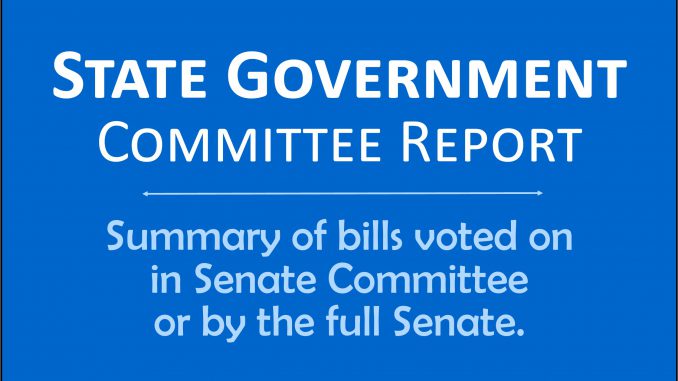
SF 408 – Licensure for architects
SF 489 – Legalizing consumer fireworks
HF 295 – Local government pre-emption
HF 462 – Confidentiality of certain gambling records
FLOOR ACTION
SF 489 allows the commercial sale of fireworks. Under Iowa law, snakes and sparklers are the only fireworks legal to possess or light. A violation is a simple misdemeanor. However, a county board of supervisors or the Department of Natural Resources (DNR) may grant a permit to display fireworks if it is handled by a competent operator.
SF 489 makes these changes:
- License and Fees: The state fire marshal will establish a consumer fireworks seller’s license. There will be two classes of consumer fireworks and five fee levels:
- $1,000 annual licensing fee for a retailer at a permanent building who devotes 50 percent or more of their space to selling or displaying first-class consumer fireworks.
- $500 annual licensing fee for a retailer at a temporary structure who devotes 50 percent or more their space to selling or displaying first-class consumer fireworks.
- $400 annual licensing fee for a retailer who devote less than 50 percent of their space to selling or displaying first-class consumer fireworks.
- $400 annual licensing fee for a community group that sells first-class consumer fireworks.
- $100 annual licensing fee for a retailer or community group that sell only second-class consumer fireworks.
- Insurance: Retailers and community groups must maintain commercial general liability insurance with specified coverage amounts.
- Annual Registration Fee: $1,000 annual registration fee for a wholesaler, which is deposited in the consumer fireworks fee fund. The fund will be used for the state fire marshal’s duties related to consumer fireworks and grants to local fire protection and emergency medical service providers.
- Violations: A consumer fireworks seller can have their license revoked for intentionally violating requirements. A violation of a licensing or registration provision established in Code or by rule is a simple misdemeanor, punishable by confinement for no more than 30 days or a fine of at least $65 but not more than $625, or both.
- Timeline for Selling and Using/Setting Off: Consumer fireworks can be sold and used from June 1 to July 8 and from December 10 to January 3.
- Underage Buying/Selling: Selling consumer fireworks to someone under 18 is a simple misdemeanor. Anyone under 18 who purchases consumer fireworks commits a simple misdemeanor. A simple misdemeanor is generally punishable by confinement for no more than 30 days or a fine of at least $65 but not more than $625 or both, but the bill provides for a fine of at least $250.
- Restrictions/Opt Out: The state fire marshal may suspend the use of consumer fireworks, display fireworks or novelties if they would constitute a threat to public safety. Penalty is a simple misdemeanor and at least a $250 fine.
- A county board of supervisors or city council may adopt an ordinance or resolution to prohibit or limit the use (NOT the sale) of consumer fireworks or display fireworks if they are a threat to public safety or a nuisance. Penalty is a simple misdemeanor and $250.
- Rulemaking and Effective Dates: The state fire marshal will adopt emergency rules to implement the bill, which will be effective immediately upon filing. The bill takes effect upon enactment.
[3/22: 34-14 (party-line, except Allen, Bowman, Danielson, Dotzler, Horn, Lykam, Taylor voting “yes”; D. Johnson voting “no”; Brown, Shipley absent]
HF 462 (SF 396) deals with the confidentiality of certain gambling records. The Iowa Racing & Gaming Commission (IRGC) has access to all casino records to ensure they uphold the standards and integrity of gambling. Accordingly, except for what is to be made public as outlined in statute (i.e., admissions, amount wagered and adjusted gross receipts), all other records kept by the casino are considered sensitive and proprietary-confidential, and not to be shared with competitors. HF 462 is a technical clean up. The Commission clarifies records listed in this bill would be kept confidential. The bill was amended by the House to include clarification that a casino’s certified audit would be made public. The amendment continues to protect the business’s marketing expenses and other supplemental schedules that a casino must provide to their regulator, but should be kept confidential from competitors.
[3/20: 49-0 (Shipley excused)]
COMMITTEE ACTION
SF 408 (referred from Commerce) requires licensure rather than registration of architects practicing in Iowa and makes conforming changes to Code sections that reference registration as an architect. The term “licensure” is used when a professional’s actions are regulated by a Practice Act, and the credentials are more rigorous (involving education, training and examination requirements). “Registration” refers to a state roster that may include regulation by a Title Act, which does not apply in Iowa. The Iowa Chapter of the American Institute of Architects requested the legislation to better reflect the occupational regulation based on public health, safety and welfare. In Iowa, engineers and landscape engineers are licensed rather than certified, and all states bordering Iowa (except Wisconsin) require architect licensure.
[3/22: 15-0]
HF 295 prohibits a city or county from adopting an ordinance, motion, resolution or amendment providing for any terms or conditions of employment that exceed or conflict with federal or state law relating to the minimum or living wage rate, any form of employment leave, hiring practices, employment benefits, scheduling practices, or other terms or conditions of employment. Any action adopted prior to the effective date of the bill is void and unenforceable on and after the effective date. The same provisions apply to the sale or marketing of consumer merchandise and containers. The bill is effective upon enactment.
[3/22: 9-6, party line]
